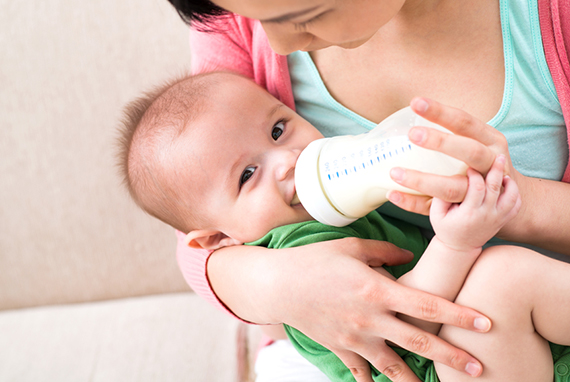Sometimes I look back on my first pregnancy and laugh at how naive I was. I laugh, and laugh, and then I cry. And somewhere in there, I pee a little.
I don’t recall thinking much at all about how I was going to feed my baby. Ha! I skipped the formula chapter in the booklet the doctor gave me. It looked complicated: so much sterilising! Screw that. I was going to breastfeed! Or so I assumed.
In January 2010, The Android was born. It was a forceps delivery, and my long recovery contributed to post-partum depression. Android developed jaundice, as many newborns do. He needed hydration to flush bilirubin from his liver, they told me, but my milk was slow coming in. We returned to hospital to start a strict schedule of breastfeeding, formula supplementing (which, no, they didn’t “push,” but certainly provided), and pumping. It allowed me precisely 10 minutes in each 3-hour cycle to sleep, eat, or hobble to the toilet. Luxury!
I still refer to this period as my “military sleep deprivation experiment.” If I’d known at the outset, the effect this was going to have on my mental health, I would have abandoned breastfeeding immediately. But for reasons I still can’t articulate, I kept up with combination feeding for 6 months, before moving to formula-only. At that point, the transition was easy. You know, apart from the guilt.
In the five years since his birth, I’ve heard people say plenty of rage-inducing things (on the internet, mostly) about parents who formula feed. I believe in my heart that I made the wrong choice by sticking with breastfeeding in those early days (and I say this now, after exclusively breastfeeding my second child for a full year, with blissful results). Anyway, here are just a few things I’ve heard people say, accompanied by my snarky replies.
1. “Breast is best.”
I’ve read the studies. I know human milk is the perfect food for human babies. But if it’s accompanied by a mother who’s being driven insane by breastfeeding, that cancels out the benefits, in the grand scheme. (Also, maybe let’s not talk about “the breast” as if it’s separate from a human woman with rights and feelings?)
2. “Formula companies are evil.”
Pffft. All companies are evil! There, doesn’t that make you feel better? Yeah. There. But seriously. Are formula companies trying to make money? Yes. Are they trying to take advantage of vulnerable mothers? Possibly. All advertising plays on some vulnerability or insecurity. The marketing ploys formula companies use are not particularly unique or egregious.
3. “Formula contains toxic chemicals.”
Hey, so does breastmilk. Really! It does. Everything does. But chemicals are not inherently toxic; the toxicity is in the amount and configuration of the chemical. This information is readily available in a grade 10 textbook. Chemophobia (or fear of chemicals) is a social trend with little foundation in real science. Please, get the facts on chemicals from qualified people.
4. “All women are able to breastfeed.”
Considering that some women don’t even have breasts, I really doubt this one. And like they say, just because you can sing, doesn’t mean you should. Just because you can produce milk, it doesn’t mean the practice of breastfeeding is the best choice for you and your baby. Biological determinism is the enemy of social justice.
5. “It’s cheaper to breastfeed.”
You can’t put a price on a happy mom. Breastfeeding can come at a high cost that isn’t measured in dollars, but even talking money — some women have jobs where it would be extremely difficult, if not impossible, to pump. It may well be more expensive for them to change jobs so they can breastfeed.
6. “You’re just not properly educated on the issue, you’re making excuses.”
I don’t need excuses. At some point, we have to give up trying to “educate” people into making the same decision we would make. We’ll simply never know if all our decisions are equally informed; we can’t measure that. Fortunately, rights to personal freedom and bodily autonomy aren’t dependent on being “educated enough” to exercise them in a certain way.
Let’s face it: first-time moms who make the decision to breastfeed don’t really know what they’re committing to: they’ve never done it before. So if it’s overwhelming, let’s honour that feeling. Let’s offer women support to breastfeed, but let’s also check whether they’re feeling encouraged or pressured by that support, and adjust our behaviour accordingly. In Canada, we’re fortunate enough to have clean water and safe formula.
The baby will be okay.
The mom deserves to be okay, too.
*Opinions expressed are those of the author, and not necessarily those of Parent Life Network or their partners.



 Sponsored
Sponsored




